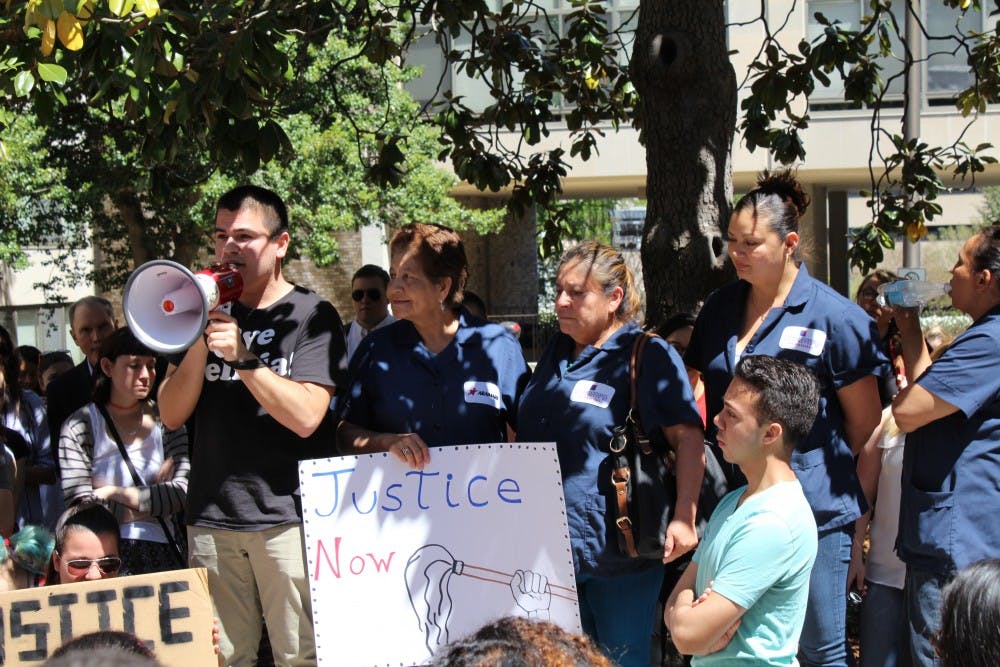Over the past few years at AU, multiple groups and campaigns such as the Student Worker Alliance and “Exploited Wonk” have worked to bring attention to worker rights on campus. However, these groups are now coming together to form the new “Justice for AU Workers Coalition” and a bigger platform for advocacy.
Senior Carlos Vera, the current chair of the coalition, said he recognized the need for such an organization after working with individual groups on the “Exploited Wonk” campaign and other workers rights movements. He realized that grassroots support was not enough to get the University to acknowledge the climate of poor workers’ rights, and that institutional support would be necessary to make an impact.
“The reason why we did this, is after starting Exploited Wonk in the last year, with every fight and every campaign and whatnot, we’ve gotten more groups involved,” Vera said. “So at one point we realized that we need something bigger than just a club, so I said, you know, it’s time for a coalition.”
Since its formation, the coalition has prioritized three main values, according to Vera. The first is determining how AU can work with outside third parties to incorporate worker expectations into their contracts. The second focuses on creating scholarships for the children of Aramark workers to attend AU, similar to the policies in place for children of faculty and staff members of the University. The third is improving worker pensions to ensure that workers are able to retire at an appropriate time.
Vera also said the coalition is strategically structured to incorporate diverse voices and perspectives. The coalition includes a chair, which will always be a student, two vice-chairs, composed of one worker and one faculty member, and then a board made up of different campus clubs and institutions.
Over the past year, the coalition has grown in supporters, currently including Student Government, the Student Worker Alliance, 45 faculty members, 10 clubs and is still growing, providing a strong front for the increased institutional backing.
Professor Mary Gray, from the Department of Mathematics and Statistics, has worked at AU for the past 47 years, and has been working with Vera and other coalition founders to encourage more faculty members to participate.
“I’ve been trying to be helpful in getting the administration to do what they’ve been promising to do with respect to looking into the working conditions for the workers, and getting some of the long term employees who are getting ready to retire some decent pensions,” Gray said.
Specifically, both Gray and Vera mentioned that faculty interest has peaked since the arrest of former professor Jim McCabe in October 2015, who was arrested in TDR after protesting for improved worker benefits.
Gray said she thinks that faculty involvement in the coalition is key to show ongoing support for workers, especially as workers and faculty share the common goal of making AU a better place.
“The workers are part of the University, and you know, it’s up to faculty to try to look out for other people who are also working for the same things we are, just in a different role,” Gray said.
In addition to faculty, the AU Undergraduate Senate passed a bill on Feb. 21, officially joining the coalition and signing onto its charter. Outgoing Speaker of the Undergraduate Senate Gabriel Unruh said he thinks SG’s involvement in the coalition offers an ongoing outlet for positive change and collaboration to occur regarding workers’ rights.
While joining the coalition was the first step, Unruh said he thinks SG members must uphold their commitment to workers rights and remain involved in the coalition as much as possible through its legislative power.
“I hope that a lot of the members of SG, including the elected officials, will be active members of the coalition,” Unruh said. “The coalition is going to have meetings and events and stuff, so that’s my vision for it; but also continuing to support the initiatives that the coalition is pursuing through legislation or through advocacy.”
Another workers rights group on campus, the Student Worker Alliance, joined the coalition during this past semester as well.
Junior Meghana Nerurkar, one of the heads of the outreach committee for SWA, said she felt it was imperative for SWA to join the coalition as its goals directly align with those of the coalition as a whole.
Nerurkar said depending on the specific issue, the administration has demonstrated mixed responses in terms of addressing workers’ rights. Therefore, she said she thinks the coalition will be much more powerful by uniting those across campus and forcing the University to respond.
“I think it absolutely will help put more pressure on the administration to know that the people who care about workers rights on campus are not only the members of Student Worker Alliance, but members of clubs all across campus, a number of faculty members, workers themselves all joining together to create one larger coalition,” Nerurkar said. “I think that’s going to be very powerful in getting the administration to listen to us and maybe even outside media.”
The coalition is currently open to everyone, and will be communicating with students in the near future about how to get involved, according to Vera. He encouraged students committed to workers’ rights to participate, but also for all students in general to at least acknowledge the impact that University workers have on their college experience.
“People say, ‘Oh I’m not an activist.’ And I tell them, do you go to TDR? Do you use a restroom? You know, then you should care, because they make life better for everyone here,” Vera said.





